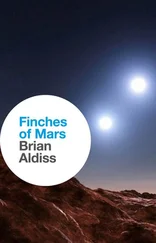Brian Aldiss - White Mars
Здесь есть возможность читать онлайн «Brian Aldiss - White Mars» весь текст электронной книги совершенно бесплатно (целиком полную версию без сокращений). В некоторых случаях можно слушать аудио, скачать через торрент в формате fb2 и присутствует краткое содержание. Год выпуска: 1999, ISBN: 1999, Издательство: Little, Brown UK, Жанр: Фантастика и фэнтези, на английском языке. Описание произведения, (предисловие) а так же отзывы посетителей доступны на портале библиотеки ЛибКат.
- Название:White Mars
- Автор:
- Издательство:Little, Brown UK
- Жанр:
- Год:1999
- ISBN:0-316-85243-0
- Рейтинг книги:5 / 5. Голосов: 1
-
Избранное:Добавить в избранное
- Отзывы:
-
Ваша оценка:
- 100
- 1
- 2
- 3
- 4
- 5
White Mars: краткое содержание, описание и аннотация
Предлагаем к чтению аннотацию, описание, краткое содержание или предисловие (зависит от того, что написал сам автор книги «White Mars»). Если вы не нашли необходимую информацию о книге — напишите в комментариях, мы постараемся отыскать её.
White Mars — читать онлайн бесплатно полную книгу (весь текст) целиком
Ниже представлен текст книги, разбитый по страницам. Система сохранения места последней прочитанной страницы, позволяет с удобством читать онлайн бесплатно книгу «White Mars», без необходимости каждый раз заново искать на чём Вы остановились. Поставьте закладку, и сможете в любой момент перейти на страницу, на которой закончили чтение.
Интервал:
Закладка:
“In our discussions here, I have noticed the frequency with which ancient authorities are appealed to, from Aristotle and Plato onwards—to Count Basie, I may say. This is because our consciousness has a collective element. ‘No voice is ever lost,’ if I may take my turn at quoting. Our consciousness has been enriched by the minds of those good men who lived in the past. Perhaps you may regard this as a mental evolutionary principle of cooperation in action.
“Consciousness is unlike any other phenomenon, compounded of many elements and apparent contradictions along the quantum-mechanical level. In the close quarters engendered by its shell, the huddled creatures of Olympus would probably have developed a form of consciousness.
“I will also venture the suggestion that here in our cramped quarters we could be developing a new step forward in human consciousness, represented by the word ‘utopian’. A thinking alike for the common good…
“If that is so—and I hope it may be so—it will mean the fading away of individualism. This is what has happened with our friend Chimborazo, if I guess correctly. It has become a single creature consisting of the symbiotic union of all indigenous Martian life.”
Came a shout from the audience. “What gives you the idea that this weird mind is good?”
Dreiser responded thoughtfully. “I repeat that individualism had no chance on Mars. To survive, this entity evolved a collective mind. It has therefore learned control … But we can only speculate upon all this. With awe. With reverence.”
Here Kathi chipped in to say, “It may seem to us slow and ponderous, but why should we not believe it to be superior to our own fragmented minds?”
After the talk, Helen Panorios came up to Dreiser and asked, timidly, why Olympus had camouflaged itself as a volcano.
“Olympus lies among other volcanoes. So it can become pretty well lost in the crowd.”
“Yes, sir, but what has it camouflaged itself against?”
Dreiser regarded her steadily before replying. “We can only suppose—although this is terrestrial thinking—that it feared some great and terrible predator.”
“Space-born?”
“Very probably space-born. Matrix-born…”
From this occasion onwards, Dreiser and I spent more time together, discussing this extraordinary phenomenon. Sometimes he would call in Kathi Skadmorr. Sometimes I called in Youssef Choihosla, who professed an empathy with Olympus.
One of the first questions I asked Dreiser was, “Are you now going to abandon your search for the Omega Smudge?”
He stroked his moustache as if it was his pet, gave me an old-fashioned look, and replied with a question, “Are you going to abandon your plans for a Utopian society?”
So we understood each other. Ordinary work had to continue.
But it continued under the shadow of that enormous life form that unceasingly inched its way towards us. Despite warnings to the contrary, the four of us drove out one calm day to inspect Olympus at close quarters. Crossing the parched terrain, we began to climb, bumping over parallel fracture lines. Kathi, in the rear seat with Choihosla, seemed particularly nervous, and clutched Choihosla’s large hand.
When I jokingly made some remark to her about her nervousness, she replied, “You might do well to be nervous, Tom. We are crossing Chimborazo’s holy ground. Can’t you feel that?”
The terrain became steeper and more broken. Dreiser drove slowly. The exteroceptors were all about us. They seemed thicker here, more reluctant to slide back into the frozen regolith. The buggy dropped to a mere crawl. Dreiser flicked his headlights on and off to clear the track. “God, for a gun!” he muttered. We were all tense. No one spoke.
We surmounted a bluff, and there the rim of it was, protruding above ground level like a cliff. We stopped. “Do we get out?” I asked. But Kathi was already climbing from the vehicle. She walked slowly towards Chimborazo.
I got out and followed. Dreiser and Choihosla followed me. Suited up, we could hear no external sound.
Even near to, Olympus closely resembled a natural feature, its flanks being terraced in a roughly concentric pattern. There were imitations of flowlines, channels and levees, as well as lines of craters that might or might not be imitations of the real things. We could by no means see all of its 700-kilometre diameter. Even the caldera was hardly visible, though a small cloud of steam hovered above it. Whether as a volcano or a living organism, it seemed impossible to comprehend.
In its presence I felt the hair at the back of my neck prickle. I simply stood and stared, trying to come to terms with it. Dreiser and Choihosla were busy with instruments, noting with satisfaction that there was no radiation reading, receiving a CPS.
“Of course there’s a CPS,” said Kathi. “Do you really need instruments to tell you that? How’s the back of your neck, for instance?”
Braver than we were, she climbed up on to the shell and lay flat upon it, her little rump in the air. It was as if—but I brushed aside the thought—she desired sexual intercourse with it.
After a while, she returned and joined us. “You can feel a vibration,” she said. She returned to the buggy and sat, arms folded across her chest, head down.
13
At this period, I used to like to go with my baby daughter to a small cafe on P. Lowell called the Oort Crowd. The talk there was all about Chimborazo. The threat from outside seemed to have drawn people together and the cafe was more crowded than ever.
My Ambient was choked with messages from Thorgeson, which alternated between apologies, supplications, abuse and endearments. I preferred cafe life, as did Alpha.
Although I did not wish to be impolite, I eventually sent Thorgeson a message: “Go to hell, you and your ventriloquist’s dummy!” At the same time, I found some sheets on the Ambient network and tried to gain a better understanding of particle physics. I was making little progress, and called Kathi, asking if I might see her.
“I’m busy, Cang Hai, sorry. We have problems.”
Trying to keep the disappointment from my voice, I asked her what the problems were.
“Oh, you wouldn’t understand. There’s some trouble with the smudge ring. Stray vortices in the superfluid. We’re getting spurious effects. Sorry, must go. Meeting coming up. Love to Alpha.” And she was gone.
Possibly this was what my Other in Chengdu had warned me about. I had been walking up a mountain with a king—or at least a man with a crown on his head. The air was so pure. We listened to bird song. Another man came along. He too had something on his head. Or perhaps it was a mask. I wanted him to join us. He smiled beautifully, before starting to run at a great pace up the mountain ahead of us. Then I saw a lake.
The manager of the Oort Crowd was Bevis Paskin Peters. He had taken over a department of the old Marvelos travel bureau. He ran the cafe very casually, being a part-time dress designer—the planet’s first. Peters was rather a heavy man, with a sullen set to his features that disappeared when he smiled at you. In those moments, he looked amazingly handsome.
However, Peters was not the reason I went to the Oort Crowd. Nor was Peters often there, leaving the running of the cafe to an assistant, a fair-haired wisp of a lad. I went because Alpha loved to watch the cephalopods. The front wall of the cafe consisted of a thin aquarium in which the little cephalopods lived, jetting their way about the tank like comets.
A YEA marine biologist had become so attached to his pets that he had brought two pairs with him to Mars. Convinced of their intelligence, he had built them a computer-operated maze. The maze, built from multicoloured perspex, occupied the tank. Its passageways and dead ends altered automatically every day. The cephalopods multiplied and had to be culled, so the Oort often had real Calamari on the menu. Ten of the creatures lived in the tank, and seemed to take pleasure in threading their way about the maze.
Читать дальшеИнтервал:
Закладка:
Похожие книги на «White Mars»
Представляем Вашему вниманию похожие книги на «White Mars» списком для выбора. Мы отобрали схожую по названию и смыслу литературу в надежде предоставить читателям больше вариантов отыскать новые, интересные, ещё непрочитанные произведения.
Обсуждение, отзывы о книге «White Mars» и просто собственные мнения читателей. Оставьте ваши комментарии, напишите, что Вы думаете о произведении, его смысле или главных героях. Укажите что конкретно понравилось, а что нет, и почему Вы так считаете.










